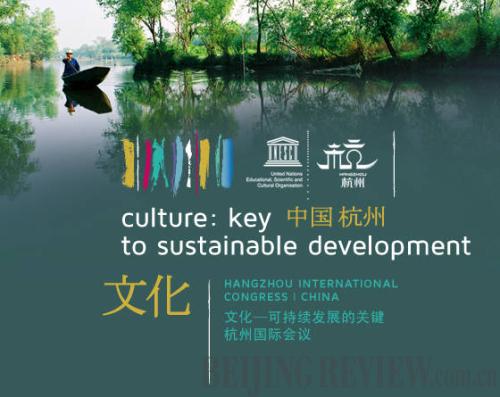|
 |
|
(COURTESY OF UNESCO) |
An international congress entitled "Culture: Key to Sustainable Development" will be held on May 15-17 in Hangzhou, the capital city of east China's Zhejiang Province.
The congress, organized by the United Nations Educational, Scientific and Cultural Organization (UNESCO) with the support of the Chinese Government, will focus on the linkages between culture and sustainable development, engaging the international community in an open debate on cultural contributions to sustainability.
The results of the three-day discussion will serve as a substantial input to the framework for the post-2015 UN sustainable development agenda.
"Culture is what makes us who we are, it gives us strength, and provides answers to many of the challenges we face today," said UNESCO Director General Irina Bokova.
UNESCO has long advocated that culture is essential to sustainable development, because of the resources it embodies for individuals and communities as a source of innovation and creativity.
"Cultural factors influence lifestyles, consumption patterns, values related to our interaction with and stewardship of the natural environment," said a UNESCO news release.
A recent study of the world's top accounting firm PricewaterhouseCoopers showed cultural and creative industries are the fastest-growing sectors of the global economy. While culture was absent from the Millennium Development Goals (MDGs), a series of international development goals scheduled to be accomplished by 2015, integrating the cultural dimension into actions and goals in achieving sustainable development is an approach that is making its way on the international level.
According to the UNESCO website, the outcome document of the 2010 MDG Summit emphasized the importance of culture for development and its contribution to the achievement of the MDGs.
Despite the progress made, the most recent UN Conference on Sustainable Development, June 2012's Rio+20, accorded very modest weight to culture.
The Rio+20 experience shows that unless a thorough examination of the nexus between culture and sustainable development is done in the global community, the post-2015 development framework and decision makers will not be fully informed on the effective contribution of culture to sustainable development.
"The power of culture is increasingly recognized by countries across the world. We now need determined political will to act on this recognition, to mainstream culture in all development strategies and programs at global, regional and local levels, to integrate culture within national development goals," Bokova said.
The congress will bring together some 450 policymakers, leaders from development institutions, and representatives of the private sector, civil society, academia and the arts from all around the world.
(Reporting from New York City) | 